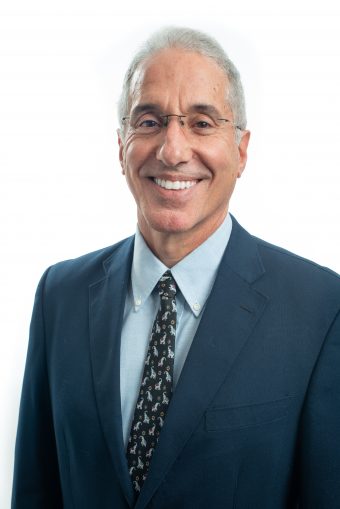
Oct. 29, 2019
Peter Motavalli is an adventurer at heart.
While Motavalli and his twin brothers, Jim and John, were born among a close extended family in Connecticut, they also traveled the world with their parents, settling for times in India and Iran, where their father, a civil engineer, had worked.
As an adult, Motavalli continued to explore new regions of the world, including a stint in Sudan as a Fulbright scholar and consultant, time in London and eventually a post at the University of Guam, where he researched the impact of land management on environmental issues such as water quality and erosion.
Today, Motavalli, a professor of soil fertility and plant nutrition in the College of Agriculture, Food and Natural Resources at the University of Missouri since 1999, is a sort of Indiana Jones of soil science. He is an academic explorer with an innate desire to inspire students to appreciate soil science and to understand its relevance in solving multiple environmental and agricultural issues at far-ranging scales from the MU campus to the world.
Each course he teaches is an adventure in learning — for the students and Motavalli.
“To have a successful teaching program, you must be constantly modifying and assessing your approach,” he said. “Teaching has allowed me to be creative, and I’ve appreciated that.”
It’s that drive for innovation that earned Motavalli a 2019 William T. Kemper Fellowship for Teaching Excellence award. Chancellor Alexander N. Cartwright, administrators and staff surprised Motavalli this spring with the honor, which includes a $10,000 award.
Motavalli didn’t grow up dreaming of becoming a professor or researching things such as the negative effects of climate change and soil degradation in food insecure countries. He was simply curious about the world, which sparked in him an adventurous spirit that he followed to such places as the University of Khartoum in Sudan. There, as a young Fulbright scholar, Motavalli traveled up and down the Nile, studying agricultural developments. Once he found himself travelling in a lorry seated next to a Sudanese tribesman armed with a large sword and a dagger.
But it never occurred to Motavalli to be afraid — he was a young American on an adventure.

Motavalli’s father was Iranian, his mother was American, and each attended Cornell University. However, the couple met after World War II in Japan, where Motavalli’s mother was living at the time and his father was working for a company rebuilding the country. It seems international happenstance runs in the family because years later, Motavalli would meet his wife, who is German, while they were both in India.
So, it’s no wonder that Motavalli brings a spirit of exploration to his classroom.
“When you are exposed to different international cultures as a young person, you become more interested in learning about the world and more aware of your own culture,” he said.
Motavalli uses active learning strategies to engage his students. Instead of the traditional lecture format, he uses “flipped classrooms” and “inquiry-based learning,” which force his students to take a more active role in their education. They explore and apply soil science concepts, develop problem-solving and communication skills they will need for their careers, and produce projects that could have impact outside the classroom, such as research posters, popular articles, extension publications, digital media and creative ideas for new environmental technology. One semester, Motavalli’s students wrote a manual for soil and plant testing that was requested by the Missouri National Guard stationed in Afghanistan to support agricultural development.
His students also escape the classroom and tour MU’s campus, where they learn about storm water drainage, water pollution and multiple environmental monitoring stations, including those at Sanborn Field and Capen Park — stations Motavalli helped establish in partnership with a student club.
Lindsey Anderson, a former undergraduate student at MU who took two of Motavalli’s classes, appreciated the way he connected real-world applications to what she learned in class.
“My favorite aspect of Dr. Motavalli’s teaching was his ability to apply what we were learning to real-world problems through in-class case studies,” Anderson said. “I found this activity very beneficial because often in college we are lectured on topics, but rarely are we put in a setting where we must apply what we know to a real issue.”
Motavalli is especially passionate about helping his students develop as writers because he’s convinced that today’s scientists must be able to communicate their research and areas of interest to everyday people, whether that’s through an article or other media works.
“How are we evaluated as scientists? It’s all our publications and other forms of formal and informal communication we produce,” he said. “It didn’t used to be that scientists had to be such public relations sorts of people, but it’s gotten that way in a big way. I totally believe it’s necessary to get our research out to the public in forms that are clear and understandable so that people understand why our research is relevant and why it can impact their lives."
Working with the MU Campus Writing Program, Motavalli was one of the first members of the editorial board of the undergraduate student writing journal, Artifacts, in which he actively encourages his students to publish their work. As a result, several students have received writing awards.
“Dr. Motavalli has a vision that the MU campus environment should be a living laboratory in which students can have hands-on experience and learn about important environmental issues,” said Patrick Market, professor of meteorology and interim director of the MU School of Natural Resources.
Motavalli has helped develop campus environmental mapping software that provides access to geographically referenced environmental information on campus and can be used for environmental projects and assignments. His students have even used a web-based geographic information system — a framework for gathering, managing and analyzing data — to develop campus environmental tours and web-based students guides for environmental resources on the MU campus.
Finally, Motavalli is dedicated to improving teaching excellence at MU and beyond. He created and led the Student Teaching as Research (STAR) program at MU, which gives MU graduate students and post-doctoral scholars opportunities to conduct teaching research projects. Currently, he serves on the advisory board of the new Teaching for Learning Center. In the MU Office of Graduate Studies, he was the campus leader for the Center for the Integration of Research, Teaching and Learning (CIRTL), a network of 43 research universities in the U.S. and Canada dedicated to improving Science, Technology, Engineering and Mathematics (STEM) education.

Frank Johnson, a doctoral student studying soil science, noticed that Motavalli’s passion for teaching extends beyond the classroom.
“Dr. Motavalli encourages me, as well as his other students, through his patience, intellect, ability to listen and dedication to ensuring that his students succeed,” Johnson said. “He is the kind of educator who resembles excellence and is invaluable to the University of Missouri. It is clear that teaching is a passion of his and that it never stops, whether we are inside or outside the classroom.”
Motavalli also encourages his students to take risks, be creative and step out of their comfort zone.
Brendan Zurweller, a former undergraduate and graduate student of Motavalli who is now an assistant professor of plant and soil science at Mississippi State University, said Motavalli played a critical role in encouraging him to face his fears and take a junior-level writing course he was dreading.
“Success in his course was paramount in my undergraduate education because it allowed me to gain the confidence needed to enroll in other courses that I had interest in, despite the fear of being unsuccessful,” Zurweller said. “It also taught me a very important lesson that I often reflect on in my professional ambitions. That is, struggles often occur when someone initially jumps outside their comfort zone, but doing so results in professional growth that far exceeds only staying within your comfort zone.”
When students leave his class, he hopes they have more than a better understanding of soil science.
“I also want them to know how to identify issues, to critically evaluate those issues and to be able to communicate that information from their critical evaluation in an effective way for the audiences they are working with,” he said. “To me, that is the whole package.”
Motavalli said teaching has made him a better listener and that over the years, he’s learned to “let his hair down” and share more of his own story with students.
“I get inspired by students who take off, you can see it,” he said. “It like a teaching a bird to fly, they take off and go in their own direction.”
Peter Motavalli at a glance:
Motavalli earned a bachelor’s degree in foreign service from Georgetown University, a master’s degree in soil science from the University of Wisconsin and a doctoral degree from Cornell University. In recognition of his teaching excellence at MU, Motavalli received the Maxine Christopher Shutz Award for Distinguished Teaching in 2009.



